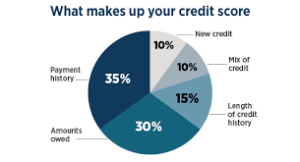

Photo credit: USAA
With the fast rise of online loan apps or microfinance banks, understanding how credit scores impact loan approval and interest rate offers has become crucial for individuals seeking financial assistance.
Credit scores serve as a critical evaluation tool for lenders, providing them with an assessment of an individual’s creditworthiness and financial responsibility. Additionally, credit scores also have a direct impact on the interest rates offered by lenders, shaping the overall cost of borrowing.
In this article, we will provide you with a step-by-step guide to understanding how credit scores impact loan approval and interest rate offers. By the end, you will have a clear understanding of the types of loans, the relationship between credit scores, loan approval, and interest, and how to optimize your credit score to improve your chances of loan approval and secure favorable interest rates, loan defaults, and delinquencies.
Types of Loans
Personal Loans
Personal loans are versatile financial tools designed to cater to a range of individual needs. These loans are unsecured, meaning they do not require collateral. Borrowers can utilize personal loans to consolidate debt, cover unexpected expenses, finance vacations, or pursue personal projects. Personal loans typically offer fixed interest rates and require regular monthly payments over a predetermined term. Eligibility is determined by factors such as credit history, income, and employment stability.
Student Loans
Student loans are specifically designed to help individuals fund their education. These loans can be obtained from private lenders or government programs. Student loans come with various repayment options, including deferred payments until after graduation or during enrollment in a qualified educational program. Interest rates may be fixed or variable, and repayment terms can span several years. The eligibility for student loans often considers the applicant’s educational pursuits, financial needs, and credit history.
Auto Loans
Auto loans provide individuals with the financial means to purchase vehicles. These loans can be obtained from banks, credit unions, or auto dealerships. Auto loans may be secured by the vehicle itself, meaning that the lender can repossess the car in case of non-payment. The interest rates for auto loans can be fixed or variable, and the repayment terms typically range from two to seven years. Eligibility depends on factors such as credit score, income, and the value of the vehicle being financed
Mortgage Loans
Mortgage loans enable individuals to purchase homes or real estate properties. These loans are typically long-term commitments, ranging from 15 to 30 years. Mortgage loans can have fixed or adjustable interest rates, and the property being purchased serves as collateral. Down payments, credit scores, income, and debt-to-income ratios are crucial factors considered during the mortgage application process. The repayment of mortgage loans occurs through monthly installments, which include both principal and interest payments.
Relationships between Credit Scores and Loans
Before we delve into the specifics, let’s first grasp the basics. Your credit score is a numerical representation of your creditworthiness, reflecting your credit history, payment patterns, and financial behavior. It serves as a measure for lenders to assess the level of risk associated with lending you money. It is a 3-digit score ranging from 300-850.
When applying for a loan, lenders typically set minimum credit score requirements. If your credit score falls below their threshold, your loan application may be rejected. However, even if you meet the minimum requirement, a higher credit score can greatly improve your chances of approval and influence the interest rate offered.
Each credit reporting agency may have its scoring model, but the most widely used one is the FICO score, which ranges from 300 to 850. A higher credit score indicates a lower credit risk, while a lower score suggests a higher risk to lenders.
Relationship between Credit Scores and Loan Interest Rates
Once you’ve cleared the hurdle of loan approval, your credit score still influences the interest rate you’ll be offered. Lenders use credit score ranges to categorize borrowers. Each range corresponds to a different level of risk. For example, a borrower with a credit score in the highest range will be considered low-risk and may receive the most favorable interest rates, while a borrower with a lower credit score may be considered as higher risk, may have a history of late payments or defaults, and receive higher interest rates.
While credit scores provide an overall snapshot of your creditworthiness, your credit history offers a more detailed perspective. Lenders may consider factors such as the length of your credit history, the types of credit accounts you have (e.g., credit cards, mortgages, auto loans), and any derogatory marks like bankruptcies or collections. A lengthy, positive credit history can enhance your chances of loan approval and may result in lower interest rates compared to someone with a shorter or less favorable credit history.
While each lender may have specific criteria, here is a general overview of credit score ranges and their impact on loan approval:
Excellent Credit (720 and above)
Individuals with excellent credit scores usually have a seamless loan approval process. Lenders perceive them as low-risk borrowers due to their proven track record of responsible financial behavior.
Good Credit (680-719)
With a good credit score, you still have a favorable chance of loan approval. However, lenders might scrutinize other factors, such as income and debt-to-income ratio, more closely to mitigate potential risks.
Fair Credit (620-679)
While a fair credit score doesn’t disqualify you from obtaining a loan, it may lead to increased scrutiny during the evaluation process. Lenders may consider additional factors, such as collateral or a co-signer, to mitigate risk.
Poor Credit (619 and below)
Individuals with poor credit scores face significant challenges in obtaining loans. Lenders perceive them as high-risk borrowers due to a history of late payments, defaults, or other negative financial events. They may require collateral or deny the loan altogether.
Debt-to-Income Ratio in Loan Approval and Interest Rates
Apart from credit scores and history, lenders also assess your debt-to-income (DTI) ratio, which compares your monthly debt obligations to your income. This ratio helps lenders determine your ability to manage additional debt responsibly.
To calculate your DTI ratio, sum up all your monthly debt payments (including credit cards, student loans, auto loans, and mortgages) and divide that by your gross monthly income. Lenders prefer borrowers with a lower DTI ratio, as it indicates a lower level of financial strain and a higher capacity to repay additional debt.
A lower DTI ratio can lead to better loan approval odds and more favorable interest rates. If your DTI ratio is too high, lenders may view you as a higher-risk borrower, and your loan application might be denied or come with higher interest rates to offset the perceived risk.
How to optimize your credit score
If your credit score is not where you want it to be, don’t worry! There are steps you can take to improve it over time and secure better loan terms:
Step 1: Repay on time
Payment history is a crucial factor in determining your credit score. Repaying on time demonstrates financial responsibility and helps maintain a positive credit history. Set up payment reminders or automatic payments to avoid missing due dates.
Step 2: Check your credit report regularly
Regularly review your credit report to ensure its accuracy. Look for any errors or discrepancies that could negatively impact your credit score. If you find any inaccuracies, report them to the credit bureaus and have them rectified.
Step 3: Manage your credit utilization
Credit utilization refers to the amount of available credit you are using. Aim to keep your credit utilization ratio below 30% to maintain a healthy credit score. Pay down existing debts and avoid maxing out your credit cards.
Step 4: Limit new credit applications
Applying for multiple loans or credit cards within a short period can negatively impact your credit score. Each application triggers a hard inquiry on your credit report, which temporarily lowers your score. Only apply for credit when necessary.
Step 5: Maintain a diverse credit mix
Having a mix of different types of credit, such as credit cards, installments, loans, and mortgages, can positively impact your credit score. However, be cautious not to take on unnecessary debt.
Effect of Employment and Income Stability
Lenders consider your employment and income stability when evaluating loan applications. They want assurance that you have a consistent and reliable source of income to meet your financial obligations.
Stable employment history shows reliability and increases your chances of loan approval. Lenders typically prefer borrowers who have been employed for at least two years in the same line of work or industry. Job-hopping or frequent changes in employment can raise concerns about your ability to sustain income and repay the loan.
Additionally, lenders assess the stability of your income. They may request documents such as pay stubs, tax returns, or bank statements to verify your income stability. Irregular or unpredictable income patterns can make lenders hesitant to approve your loan or result in higher interest rates.
The loan amount and term you request can also influence the interest rates offered. Larger loan amounts may carry higher interest rates due to the increased risk and potential financial exposure for the lender. Conversely, smaller loan amounts may be associated with lower interest rates
Responsible Lending Practices
Tcompriserises a set of guidelines and principles that lenders adhere to when granting loans. These practices aim to ensure that borrowers are granted suitable loans based on their financial capabilities and that they are not exposed to undue risks. The following key aspects exemplify responsible lending practices:
Comprehensive assessment
Lenders must conduct a thorough evaluation of a borrower’s financial situation, including their income, expenses, credit history, and existing debt obligations. This assessment helps determine the borrower’s ability to repay the loan without facing excessive financial strain.
Transparent and understandable terms
Lenders are responsible for providing clear and concise loan terms, including interest rates, repayment schedules, fees, and penalties. Borrowers should have a complete understanding of the loan agreement before accepting the loan.
Reasonable interest rates
Lenders should set interest rates that are fair and reasonable, taking into account market conditions, risk factors, and applicable regulations This check that borrowers are not burdened with exorbitant interest charges.
Avoidance of predatory practices
Responsible lenders refrain from engaging in predatory practices such as misleading advertising, hidden fees, or unfair collection practices. They prioritize the borrower’s best interests and aim to establish long-term relationships based on trust and transparency.
The regulatory framework for loans differs from country to country, with government bodies and financial regulators overseeing lending practices. They establish guidelines, monitor compliance, and enforce penalties for non-compliance. Regulatory measures may include licensing requirements for lenders, mandatory disclosures, interest rate restrictions, and the creation of ombudsman services for dispute resolution. These measures promote transparency, accountability, and fair competition in the lending industry.
Loan Defaults and Delinquencies
Loan defaults occur when borrowers fail to repay their loans as agreed upon, while delinquencies refer to late or missed payments. Both can have severe consequences. When borrowers default or become delinquent, it negatively affects their credit scores, making it harder to obtain future loans or credit cards. Lenders may report the default or delinquency to credit bureaus, resulting in a tarnished credit history that remains for several years.
This, in turn, can impact future borrowing capacity, interest rates, insurance premiums, and even employment prospects.
Loan defaults and delinquencies leave a lasting impact on personal credit history. Credit reports reflect missed payments and defaults, resulting in lower credit scores. A lower credit score signifies increased credit risk, making it challenging to secure favorable terms for future loans or credit products. Additionally, defaults may lead to collections and legal actions, further compounding the negative effects on credit history. Individuals need to understand the gravity of these issues and take proactive steps to rectify and rebuild their credit.
Although loan defaults and delinquencies can have severe repercussions, there are steps individuals to follow to manage debts and improve financial health. Some of these steps are;
- Prioritizing timely payments
- Negotiating with lenders for alternative payment arrangements
- Seeking credit counseling services
Your credit score has a significant impact on loan approval and interest rate offers. Maintaining a good credit score is essential for accessing favorable loans and interest rates. By regularly monitoring your credit report, paying bills on time, managing credit utilization, limiting new credit applications, and maintaining a diverse credit mix, you can optimize your credit score and improve your chances of loan approval. Remember, a strong credit score is an asset that opens doors to better borrowing opportunities.


